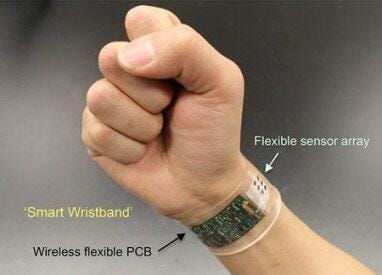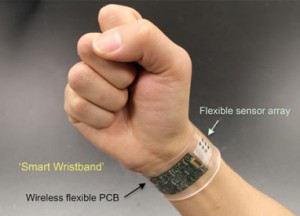Wearable Electronics Monitor Metabolites in Sweat

Researchers from UC Berkeley have developed wearable sensors that measure the metabolites and electrolytes in sweat and send the information to a smartphone. The device can monitor the users’ health in real time and warn them about fatigue or dehydration. The study was published in the journal Nature.
Wearable electronics are the future of health monitoring. Non-invasive monitoring systems that analyze sweat have been designed in the past. This body fluid contains a lot of physiological information but, so far, wearable devices monitor only one analyte at a time. Besides, signal processing circuits and calibration are deficient, compromising the accuracy of the measurements. A wearable device that accurately measures multiple analytes in sweat is lacking.
Glucose, lactate, potassium and sodium levels are monitored
Professor Ali Javey and his team have developed a sensor array that measures multiple analytes in sweat and is fully integrated -it doesn’t need external analysis. Five sensors, embedded in a flexible frame, measure skin temperature and glucose, lactate, sodium and potassium levels. The temperature measurements allow to calibrate the metabolites sensors, which are very temperature-sensitive. The flexible printed circuit board has ten chips that receive information from the sensors, amplify the signal and wirelessly transmit the data to a smartphone. The researchers implemented the circuit and sensors into wristbands and headbands and developed a smartphone app to easily monitor health during or after prolonged exercise. The device was tested in volunteers that practiced indoor and outdoor activities for long periods.
In the future, the wearable device could be more compact by fitting all functionalities in one chip. The number of measurable variables will be increased, and clinical studies about physiology and athletic performance could then be conducted.
Source: UC Berkeley


